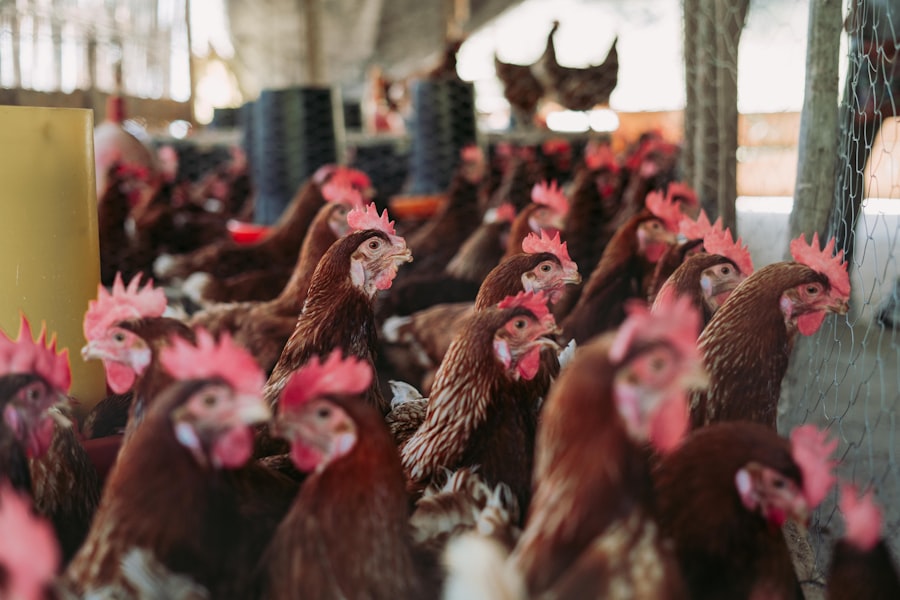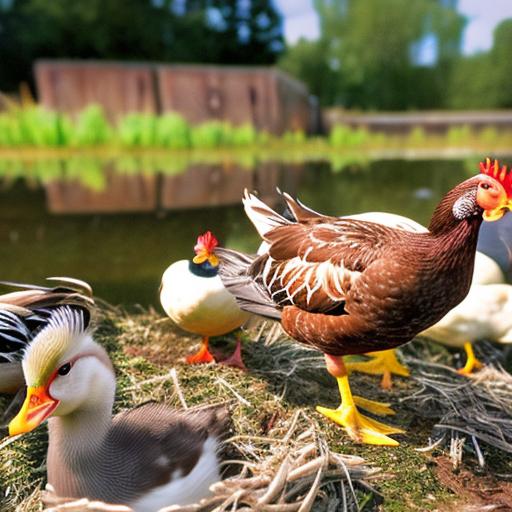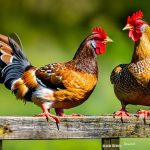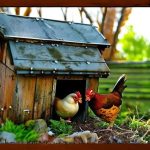Keeping chickens and ducks together in one coop can be a rewarding and efficient way to raise poultry. Not only do chickens and ducks provide companionship for each other, but they can also work together to control pests in the coop and yard. However, before deciding to keep chickens and ducks together, there are several factors to consider. This article will explore the differences between chickens and ducks, the benefits of keeping them together, factors to consider before doing so, and tips for preparing the coop and house to accommodate both species.
Key Takeaways
- Chickens and ducks have different needs and behaviors, but can be kept together with proper preparation and care.
- Keeping chickens and ducks together can provide benefits such as pest control and increased egg production.
- Factors to consider before keeping chickens and ducks together include space, diet, and potential health issues.
- Preparing separate living spaces for chickens and ducks is important to ensure their comfort and safety.
- Feeding chickens and ducks together requires careful consideration of their dietary needs and preferences.
Understanding the Differences Between Chickens and Ducks
Chickens and ducks have distinct physical and behavioral differences that can affect their cohabitation. Chickens are land-dwelling birds with wings that are adapted for short bursts of flight. They have sharp claws on their feet that allow them to scratch the ground for food. Ducks, on the other hand, are waterfowl with webbed feet that enable them to swim and paddle in water. They have a more streamlined body shape compared to chickens.
In terms of behavior, chickens are more territorial and tend to establish a pecking order within their flock. They are also more prone to scratching and digging in the ground. Ducks, on the other hand, are social animals that thrive in groups. They are less aggressive than chickens and have a tendency to wander and explore their surroundings.
These physical and behavioral differences can affect their cohabitation in a shared coop. Chickens may be more dominant and territorial, which can lead to conflicts with ducks. Additionally, chickens’ scratching behavior may disturb ducks’ nesting areas or cause damage to water sources.
Benefits of Keeping Chickens and Ducks Together
Despite their differences, there are several benefits to keeping chickens and ducks together in one coop. One of the main benefits is pest control. Ducks are excellent at eating insects, slugs, snails, and other pests that can be harmful to plants and crops. Chickens also eat insects, but their scratching behavior can help expose pests hiding in the soil. Together, chickens and ducks can provide a natural and effective pest control system.
Another benefit is companionship. Chickens and ducks can form bonds and provide social interaction for each other. This can be especially beneficial for ducks, as they are highly social animals that thrive in the company of others. Having a mixed flock can also provide entertainment and enjoyment for the owner, as they observe the different behaviors and interactions between the two species.
In addition, chickens and ducks can work together in a coop to create a more efficient living environment. Ducks produce more moisture in their droppings compared to chickens, which can help keep the coop humid and reduce the risk of respiratory issues for the chickens. Chickens, on the other hand, can help keep the coop clean by scratching and turning over bedding material.
Factors to Consider Before Keeping Chickens and Ducks Together
Before deciding to keep chickens and ducks together, there are several factors to consider. One of the most important factors is space. Both chickens and ducks require adequate space to move around, exercise, and engage in their natural behaviors. It is recommended to provide at least 4 square feet of indoor space per chicken and 10 square feet of outdoor space per chicken. Ducks require even more space, with at least 10 square feet of indoor space per duck and 20 square feet of outdoor space per duck.
Temperament is another important factor to consider. Chickens and ducks have different temperaments, with chickens being more territorial and ducks being more social. It is important to assess the personalities of your chickens and ducks before introducing them to each other. If you have aggressive or dominant chickens, they may not be compatible with ducks. Similarly, if you have shy or timid ducks, they may not thrive in a coop with assertive chickens.
Diet is also a factor to consider. Chickens and ducks have different dietary needs, with ducks requiring more water and protein. It is important to provide separate feeding areas for chickens and ducks to ensure that each species is getting the right nutrients. Additionally, ducks require access to water for swimming and cleaning their feathers, so a water source should be provided in the coop or nearby.
Preparing the Chicken Coop for Ducks
If you have an existing chicken coop and want to introduce ducks, there are several modifications you can make to accommodate them. First, ensure that the coop has a secure and predator-proof enclosure to keep the ducks safe. Ducks are vulnerable to predators such as raccoons, foxes, and dogs, so it is important to have sturdy fencing and locks on doors and windows.
Next, provide a water source for the ducks. Ducks need access to water for swimming and cleaning their feathers. This can be a small pond or pool within the coop or a nearby water source that they can access during the day. Ensure that the water is clean and changed regularly to prevent the spread of diseases.
It is also important to provide appropriate bedding material for the ducks. Ducks produce more moisture in their droppings compared to chickens, so using absorbent bedding material such as straw or wood shavings can help keep the coop dry and reduce the risk of respiratory issues for the chickens.
Preparing the Duck House for Chickens

If you have a duck house and want to introduce chickens, there are also modifications you can make to accommodate them. First, ensure that the duck house has enough space for both chickens and ducks. Chickens require perches or roosting bars to sleep on, so make sure there is enough space for them to perch comfortably.
Next, provide nesting boxes for the chickens. Chickens need a quiet and private space to lay their eggs, so providing nesting boxes with straw or shavings can encourage them to lay in the duck house. Ensure that the nesting boxes are easily accessible and cleaned regularly to prevent the spread of diseases.
It is also important to provide appropriate flooring for the duck house. Ducks produce more moisture in their droppings compared to chickens, so using a waterproof flooring material such as concrete or rubber can help keep the duck house dry and prevent the buildup of bacteria.
Providing Adequate Space for Both Chickens and Ducks
Providing adequate space is crucial for the comfort and well-being of both chickens and ducks. As mentioned earlier, chickens require at least 4 square feet of indoor space per chicken and 10 square feet of outdoor space per chicken. Ducks require at least 10 square feet of indoor space per duck and 20 square feet of outdoor space per duck.
To create separate areas for each species within the coop, you can use dividers or partitions. This will allow chickens and ducks to have their own space while still being able to interact with each other. It is important to ensure that each species has enough space to move around, exercise, and engage in their natural behaviors.
Additionally, providing separate feeding areas for chickens and ducks can help prevent competition and ensure that each species is getting the right nutrients. This can be done by using separate feeders or by feeding them at different times.
Feeding Chickens and Ducks Together
Feeding chickens and ducks together can be done successfully with some careful planning. While chickens and ducks have different dietary needs, there are ways to ensure that each species is getting the right nutrients.
One option is to provide a balanced poultry feed that is suitable for both chickens and ducks. This type of feed will contain the necessary nutrients for both species, including protein, vitamins, and minerals. However, it is important to monitor the feed consumption of each species to ensure that they are eating enough and not being outcompeted by the other.
Another option is to provide separate feeders for chickens and ducks. This can help prevent competition and ensure that each species is getting the right amount of food. It is important to monitor the feed consumption of each species and adjust the amount accordingly.
Additionally, providing access to fresh water is crucial for both chickens and ducks. Ducks require more water compared to chickens, so it is important to have a water source that is easily accessible and clean. Regularly changing the water and cleaning the water containers can help prevent the spread of diseases.
Addressing Potential Health Issues
Keeping chickens and ducks together in one coop can come with potential health issues that need to be addressed. One common issue is respiratory problems in chickens due to the increased moisture from ducks’ droppings. To prevent this, ensure that the coop is well-ventilated and that bedding material is regularly changed to keep it dry.
Another potential health issue is the spread of diseases between chickens and ducks. It is important to practice good biosecurity measures, such as regularly cleaning and disinfecting the coop, providing separate feeding areas, and monitoring the health of each species. If any signs of illness are observed, it is important to isolate the affected bird and seek veterinary advice.
Parasites can also be a concern when keeping chickens and ducks together. Both species are susceptible to external parasites such as mites and lice. Regularly inspecting and treating both chickens and ducks for parasites can help prevent infestations.
The Joys of Keeping Chickens and Ducks Together in One Coop
Keeping chickens and ducks together in one coop can be a rewarding experience for poultry enthusiasts. The benefits of pest control, companionship, and efficiency make it an attractive option for those with the space and resources to do so. However, it is important to consider factors such as space, temperament, diet, and health before introducing chickens and ducks to each other.
By understanding the differences between chickens and ducks, making necessary modifications to the coop and house, providing adequate space, and addressing potential health issues, you can create a harmonious and productive living environment for both species. So, if you have the opportunity, consider keeping chickens and ducks together in one coop and enjoy the joys of poultry keeping.
If you’re considering keeping chickens and ducks together, you may find this article on Poultry Wizard’s website helpful. It discusses the compatibility of chickens and ducks and provides valuable insights on how to successfully house them together. To learn more, check out their article on “Can I Keep Chickens with Ducks” at https://poultrywizard.com/keeping-chickens/chicken-coop-trampoline/. Additionally, Poultry Wizard offers a wealth of information and resources for poultry enthusiasts, so be sure to explore their website at https://poultrywizard.com. If you’re looking for tips on building a chicken coop that can accommodate both chickens and ducks, they also have an article specifically on “Chicken Coop Portage” which you can find at https://poultrywizard.com/keeping-chickens/chicken-coop-portage/.
FAQs
Can I keep chickens with ducks?
Yes, it is possible to keep chickens with ducks in the same coop or run.
Do chickens and ducks get along?
Chickens and ducks can get along well if they are introduced properly and have enough space to move around.
What are the benefits of keeping chickens and ducks together?
Keeping chickens and ducks together can provide a variety of benefits, including pest control, increased egg production, and entertainment.
What are the challenges of keeping chickens and ducks together?
The main challenge of keeping chickens and ducks together is that they have different dietary needs, so it can be difficult to provide them with the appropriate feed.
What should I consider before keeping chickens and ducks together?
Before keeping chickens and ducks together, you should consider the size of your coop or run, the dietary needs of each species, and the potential for disease transmission.
How can I introduce chickens and ducks to each other?
To introduce chickens and ducks to each other, it is best to do so gradually and under close supervision. You can start by keeping them in separate enclosures next to each other before allowing them to interact.
What should I feed my chickens and ducks if I keep them together?
If you keep chickens and ducks together, you should provide them with a feed that is appropriate for both species. This may include a poultry feed that is formulated for mixed flocks.
Meet Walter, the feathered-friend fanatic of Florida! Nestled in the sunshine state, Walter struts through life with his feathered companions, clucking his way to happiness. With a coop that’s fancier than a five-star hotel, he’s the Don Juan of the chicken world. When he’s not teaching his hens to do the cha-cha, you’ll find him in a heated debate with his prized rooster, Sir Clucks-a-Lot. Walter’s poultry passion is no yolk; he’s the sunny-side-up guy you never knew you needed in your flock of friends!







